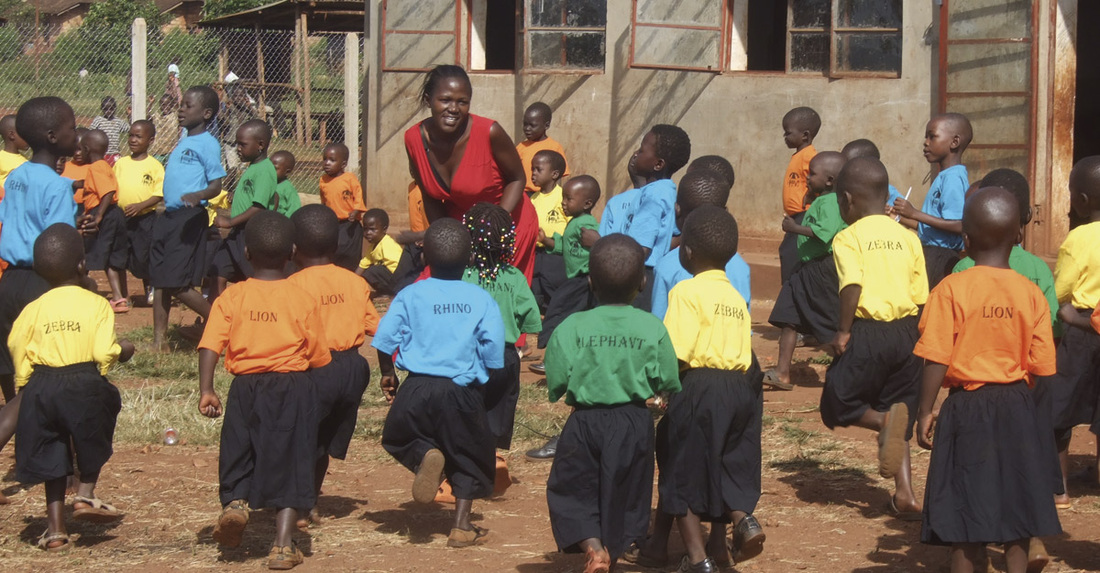|
When we were first asked to become involved in Soweto slum on the outskirts of Jinja, the conditions in this small area were appalling. 4000 people live in the slum, predominantly displaced from past conflict in Northern Uganda.
As a consequence of AIDS, many households here are child or grandparent-headed, resulting in the neglect and vulnerability of children. Child malnutrition, trafficking and child sacrifice was a common occurrence. The main industry was illegal and unlicensed alcohol production, a dangerous and unprofitable process, producing black toxic sludge that ran through the slums where children wandered. Bringing change Together with ADSN we implemented three stages of change, encouraging community ownership and child participation along the way. Stage 1 - The building of a Community Child Protection Committee 10 adults were selected and given training in child protection. In turn they began working with local people and training them about child safety, rights, parenting, health and hygiene began to create a safer, cleaner environment for children. There has been noticeable change in the attitude of the parents with many of them becoming more responsible and taking issues concerning their children seriously. In parents meetings they make suggestions on how to improve the Centre and actively participate in decision making. Children are encouraged to participate in the direction and evaluation of the programme. Near the start they were asked to map the area using twigs, flowers and leaves, showing places that were safe and happy and those that were dangerous. Through this process, ‘Film halls’ where children were lured in and abused have been identified and closed. An area by the train tracks was also identified as a place where children were prone to abduction for trafficking and child sacrifice. Through awareness training for children and the simple addition of bicycles (to ride to the police station) and loudspeakers (to alert families to strangers in the area and of missing children), the incidents of child sacrifice began to lessen in the first few years. Now the practice in Soweto has been completely eradicated in the last 18 months. The area is cleaner, with ditches built to create proper drainage, running water installed and rubbish being burned or buried rather than left to fester. Stage 2 - The establishment of a Child and Community Centre With a donated building, this Centre was created to provide early years education and nutrition for the most vulnerable children in Soweto. They are now kept safe through the day and have a chance to play, learn and enjoy being children. They enjoy annual play schemes and over the years the Centre has been transformed from a drab and dusty building to colourful, fun hive of activity, surrounded by a green grassed area full of play equipment. Stage 3 - Agriculture and sustainability From the very beginning the aim was to create something sustainable. An agricultural component to the programme resourced the Centre with nutritious and fresh vegetables, reducing the ongoing costs. As time went by it became apparent that carbs were the costly part of the food budget, so beans and maize were planted and are now providing a good, regular crop for the Centre. Nutrition experts from the local hospital give regular advice about the best varieties of food to grow for healthy diets. The agricultural component also provides the most vulnerable households with new skills, in order to grow food for their families and sell vegetables instead of earning money brewing alcohol. Bit by bit the breweries began to close down, our Director, Rachel Bentley describes how ‘On my first visit there were around 50 breweries throughout Soweto, last week I visited and there is only one left’. In addition to this, small business start ups were put into action for women, resourcing them to start their own enterprises. Some of the most vulnerable women were put in charge of the water standpipes, so they could make a small amount serving people with water. Some have pooled their start up money and set up a pottery business. In the longer term the aim is that the increase in income will enable parents to be able to pay for the costs of sending their children to primary school, once they have graduated from the Centre. Now these this work is up and running well, local people can see the change and word is spreading through neighbouring communities. Consequently we are looking to start the process again in these new areas, enabling new communities to create their own change for themselves and their children. Related stories: 2015 Playscheme reflects a transformed community Something to smile about - Dental provision in Soweto, Uganda Encouraging small business start ups for women in Uganda Find out more about our project in Uganda Donate to our work Support usComments are closed.
|
RECEIVE OUR EMAILSBlog Categories
All
Archives
July 2024
|
|
JOIN US ON SOCIAL MEDIA
|
Annual Report | Contact Us | Jobs | Media Centre | Resources | Shop
Accessibility & Policies: Accessibility | Equity, Diversity & Inclusion Policy | Complaints| Privacy Policy | Safeguarding
Accessibility & Policies: Accessibility | Equity, Diversity & Inclusion Policy | Complaints| Privacy Policy | Safeguarding
Children on the Edge, 5 The Victoria, 25 St Pancras, Chichester, West Sussex, PO19 7LT, UK | 01243 538530 | [email protected]



 Give monthly
Give monthly Fundraise for us
Fundraise for us RSS Feed
RSS Feed
